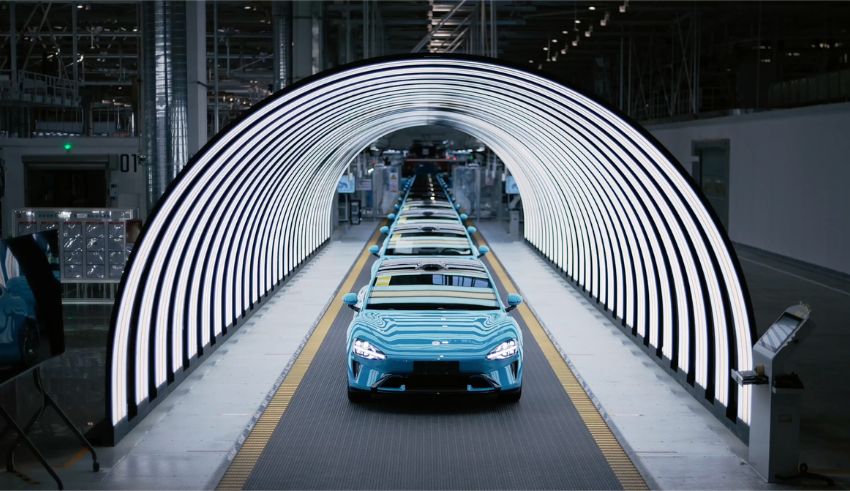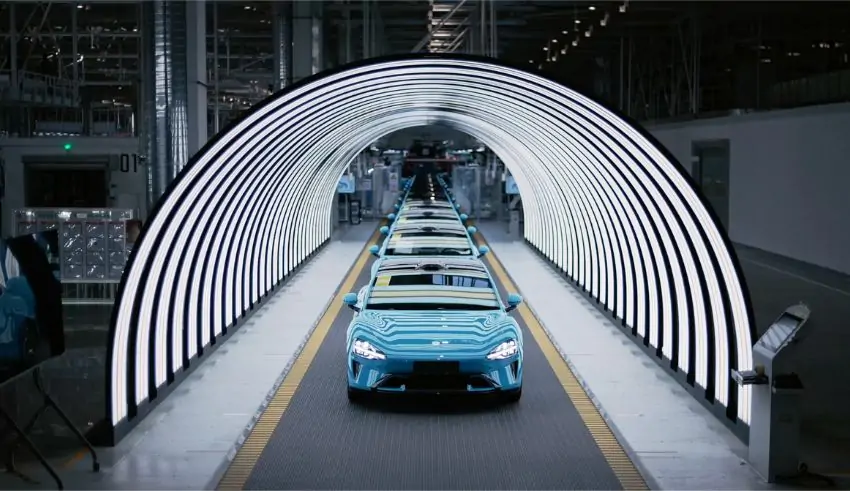

(C) Xiaomi
Usually known for its handsets, Xiaomi is now making waves in the automotive industry with its most recent product, the SU7 Ultra. Designed to challenge the dominance of present hypercars, this revolutionary electric vehicle (EV) has extraordinary performance criteria on par with even the most prestigious companies in the industry. The automotive sector is watching excitedly as Xiaomi is ready to show this aspirational car at the Nürburgring Nordschleife.
News is being generated by the amazing acceleration powers of the Xiaomi SU7 Ultra. Since it can accelerate from 0 to 120 mph in just 5.9 seconds, the company argues that this high-tech sedan fits in the top echelon of high-performance vehicles. With a tri-motor design comprising two strong “V8” motors at the rear and a less powerful “V6” motor at the front, the SU7 Ultra produces incredible 1,548 horsepower. Outpassing rivals like the Lucid Air Sapphire and even the Bugatti Chiron, this combination provides an exhilarating driving experience and a top speed exceeding 350 km/h (217 mph).
Starting with the ambition of fast racing and motorsports proclaimed by Xiaomi CEO Lei Jun, the SU7 Ultra followed Inspired by great films and shows including “Senna,” “Top Gear,” and “Fast and Furious,” Jun’s interest pushed him to pick up a racing license and investigate the complexity of automotive engineering. This personal commitment and hands-on approach had a major influence on the design and development of the SU7 Ultra, so transforming it from a vehicle to a statement of Xiaomi’s automotive industry aim.
The SU7 Ultra sets itself in design as much as in performance. Built from lightweight carbon fiber, the car features a wide body package, a clear front spoiler, aggressive brake ducting, and a sizable rear spoiler. This design approach helps the car to weigh just 4,189 pounds (1,900 kg), hence enhancing its performance on the track. Using a high-performance race battery with up to 1,330 kW of capacity, the SU7 Ultra is meant to offer both speed and efficiency.
Arriving on the automotive scene, Xiaomi’s strategy is bold: it seeks to surpass a record on the Nürburgring Nordschleife, regarded as one of the toughest tracks globally. Now running with a time of 7:07.55, this project, set for October aims to top the fastest four-door vehicle available around the course. Porsche Taycan Turbo GT Apart from rivalry, Xiaomi wants to push the boundaries of what an electric vehicle can achieve on this iconic circuit.
Even if the SU7 Ultra is still under prototype form, Xiaomi is obviously dedicated to surpassing previous performance. Though the company has not yet revealed mass production intentions, the performance of the prototype and its high aspirations lead to this vehicle to be more than just a concept. As Xiaomi gets ready for its Nürburgring challenge, the car sector is watching excitedly to see if the SU7 Ultra will set new benchmarks in the EV market.
For a company most known for its consumer electronics, Xiaomi’s entry into the automotive market is a radical departure. Joining the high-performance EV market lets Xiaomi not only extend its technological horizons but also prove to be a big player in the global automotive industry. With the SU7 Ultra, Xiaomi is redefining what is practical in electric car performance and making a statement ready to challenge the top manufacturers globally.
The Ministry of Foreign Affairs (MFA) in Singapore has upped its travel warning for Singaporeans by advising against travelling to…
With the aim of honoring the stellar performers and achievers in the music industry of South Korea, the yearly prestigious…
Children’s favourite and globally acclaimed ‘Cocomelon’ is known for their appealing animated videos which features nursery rhymes, educational songs, and…
ExecuJet MRO Services Malaysia has a reason to smile as its maintenance, repair and overhaul (MRO) received the Japan Civil…
Sony is known for catering premium quality in all types of electronics products they make for their users with their…
The European Union and Singapore agreed to a transformative Digital Trade Agreement which serves to deepen their economic relations through…
This website uses cookies.
Read More